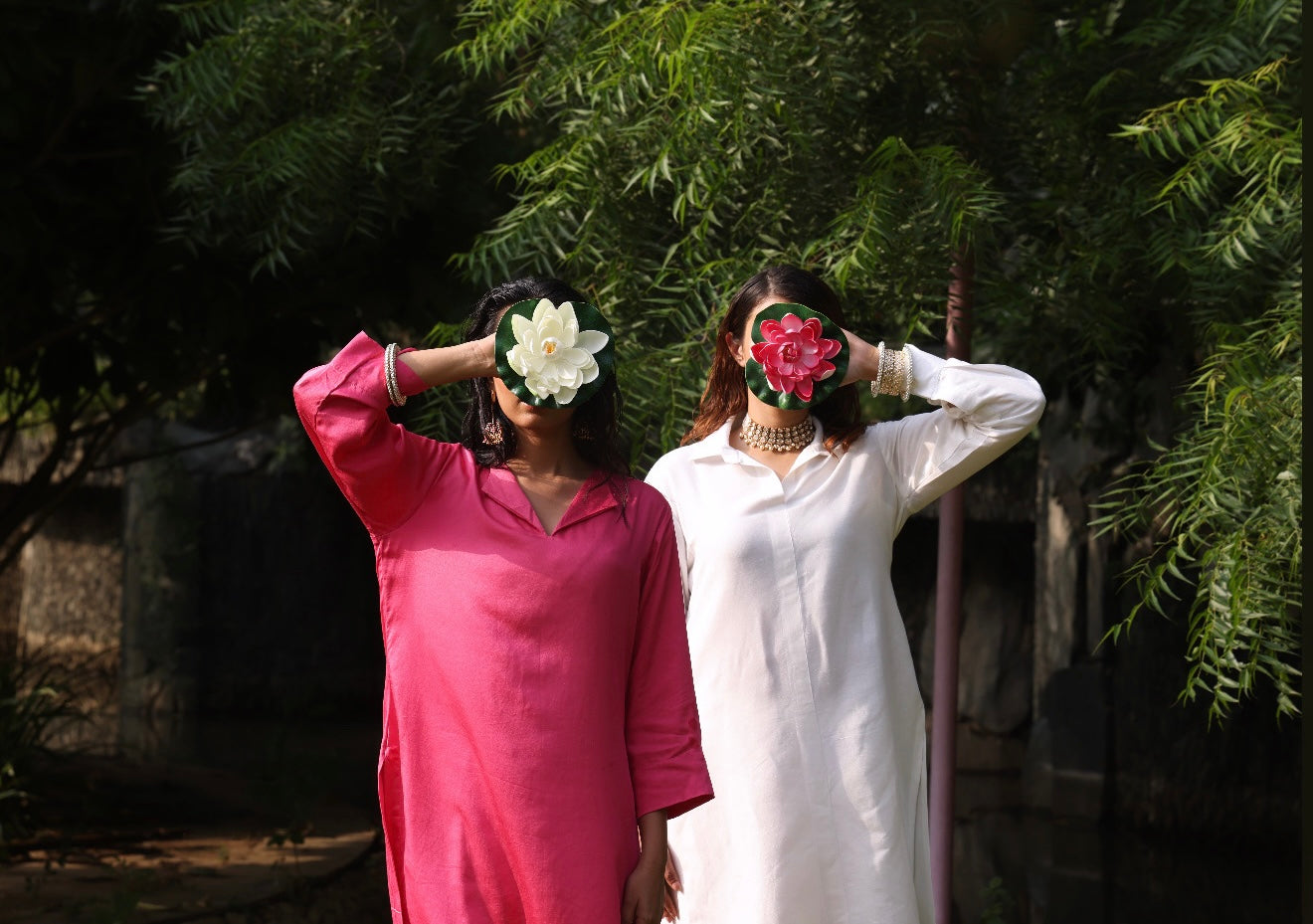When you pick out a piece of clothing, do you ever wonder where it comes from?
Not just the store or the brand, but the very fabric itself—what it’s made of and how it was created?
Most of the fabrics we wear today fall into two categories: natural fibers (derived from plants or animals) and synthetic fibers (produced from petrochemicals).
Synthetic fibers—like polyester, nylon, and acrylic—may seem convenient, but they come with a heavy environmental cost. These materials are essentially plastic, shedding microplastics into our water and taking hundreds of years to break down in landfills.
On the other hand, plant-based fibers—such as bamboo, hemp, and lotus—offer a sustainable, biodegradable, and skin-friendly alternative. Unlike animal-derived fabrics such as wool or silk, they do not involve harm to living beings. Unlike cotton, they require significantly less water and no harmful pesticides. And unlike synthetic materials, they return to the earth naturally without polluting it.
But how exactly are these fibers turned into textiles? And why should you consider them as a better choice for your wardrobe? Let’s dive into the world of bamboo, hemp, and lotus fibers—the future of ethical fashion.
1. Sustainability Aspects of Bamboo, Hemp, and Lotus Fibers
Each of these plant-based fibers boasts unique environmental benefits that set them apart from conventional textiles.
- Bamboo – One of the fastest-growing plants on Earth, bamboo regenerates naturally without the need for pesticides or fertilizers. It also requires far less water than cotton, making it one of the most renewable textile resources.
- Hemp – A truly eco-friendly crop, hemp is naturally resistant to pests, requires minimal irrigation, and improves soil health. It is also a carbon-negative plant, meaning it absorbs more carbon dioxide from the atmosphere than it emits.
- Lotus – Perhaps the rarest of the three, lotus fiber is hand-extracted from lotus stems without the use of chemicals. It is fully biodegradable and follows a zero-waste production process, making it one of the most sustainable textiles available.
By choosing these fabrics, you are actively reducing your environmental footprint while embracing clothing that is both stylish and long-lasting.
2. Comfort and Durability: Why These Fabrics Feel as Good as They Look
Sustainable fashion does not mean compromising on quality. These plant-based fibers offer an incredible balance of comfort, strength, and breathability.
- Bamboo – Naturally soft and moisture-wicking, bamboo fabrics keep you cool in summer and warm in winter. They are also antibacterial and odor-resistant, making them perfect for activewear and daily wear.
- Hemp – One of the strongest natural fibers, hemp actually softens over time while maintaining its durability. It’s ideal for rugged, everyday wear.
- Lotus – Often compared to silk, lotus fabric is incredibly lightweight, breathable, and luxurious, offering an elegant feel with none of the ethical concerns of conventional silk.
3. The Role of Bamboo, Hemp, and Lotus in Ethical and Sustainable Fashion
Beyond their environmental benefits, these fibers play a crucial role in promoting ethical production and fair trade.
- A cruelty-free alternative to silk – Unlike silk, which involves boiling silkworms alive, lotus fiber mimics silk’s elegance without harming any living creatures.
- Support for artisans – Many sustainable brands work directly with artisans to produce hemp and lotus textiles, ensuring fair wages and preserving traditional handcrafting techniques.
- No microplastic pollution – Synthetic fabrics release microplastics into the water every time they are washed, contributing to global water pollution. In contrast, plant-based fibers decompose naturally without harming ecosystems.
By choosing bamboo, hemp, and lotus textiles, you are not just making a sustainable choice—you are actively supporting ethical labor practices and reducing fashion’s environmental damage.
4. Processing Into Textiles: How These Fibers Are Turned Into Fabric
Each of these plant fibers undergoes a unique transformation process before becoming the clothing we wear.
- Bamboo – The stalks are crushed and turned into a pulp, which is then processed into fibers and spun into fabric.
- Hemp – The plant’s stalks are retted (soaked to break down natural pectins), then separated into fibers and woven into durable textiles.
- Lotus – The extraction process is entirely manual. Lotus stems are carefully hand-pulled to extract fine fibers, which are then spun into one of the world’s most exclusive and luxurious fabrics.
While bamboo and hemp can be mass-produced more efficiently, lotus fiber remains a rare and labor-intensive textile, making it one of the most precious sustainable fabrics available.
5. Seasonal Comfort, Year-Round Style
Bamboo, hemp, and lotus fabrics are not just sustainable—they are adaptable to every season. Their natural properties keep you cool in summer, warm in winter, and comfortable all year long.
Bamboo: Naturally Cooling & Breathable
Bamboo fabric absorbs moisture and dries quickly, making it perfect for hot and humid climates.
Its lightweight texture allows air to circulate, preventing overheating in summer while staying soft as a base layer in winter.
Hemp: Strong, Insulating & Durable
Hemp’s porous structure keeps you cool in summer by allowing air to flow freely.
In colder months, its natural insulation helps retain body warmth, making it great for layering.
Lotus: Lightweight, Airy & Luxurious
Lotus fabric's silk-like texture is ultra-lightweight, making it ideal for warm weather.
It wicks away moisture effortlessly, staying fresh even in muggy or monsoon seasons.
These fabrics move effortlessly across seasons—just as versatile as your favorite textiles, with the added benefit of being eco-friendly!
6. Sustainable Fabrics & House of Ambua: Fashion with Purpose
At the House of Ambua, we believe that fashion should be a reflection of both beauty and responsibility. That’s why our collections feature thoughtfully curated garments made from eco-friendly fibers like bamboo, hemp, and lotus.
Our commitment to sustainability goes beyond just fabrics—we work with skilled artisans, support ethical production, and champion a future where fashion is kind to both people and the planet.
Discover the elegance of sustainable textiles with House of Ambua and redefine fashion with a purpose.

